How American Vandal became one of the decade's best (and stupidest) mysteries
- Oops!Something went wrong.Please try again later.
TV is littered with mystery shows and true-crime rip-offs — but there's never been a mystery quite like American Vandal. This absurdist Netflix gem debuted in 2017, following high schoolers Peter (Tyler Alvarez) and Sam (Griffin Gluck) as they embark on a twisty investigation of high school drama. The two aspiring documentarians approach their puzzle like grizzled investigators, interviewing suspects, piecing together timelines, and reconstructing the scene of the crime. Their mission? To identify the culprit who spray painted dicks on every car in the faculty parking lot.
It's a supremely stupid premise, the kind that could've been a one-note joke stretched too thin. But over the course of its two seasons, American Vandal proved to be something much smarter — and sweeter. The show lovingly lampoons true-crime staples like Serial or Making a Murderer, delivering a puzzle that's both ridiculous and compelling. (In season 2, Peter and Sam returned to tackle a new mystery at a new school, investigating who spiked the cafeteria lemonade with laxatives.) Vandal quickly won over fans and critics alike, and the show even won a coveted Peabody Award, before Netflix pulled the plug.
As part of EW's Whodunnit Week, we sat down with American Vandal creators Dan Perrault and Tony Yacenda, who gamely agreed to answer all our questions about dick graffiti and "heyy" texts. (Since Vandal's cancellation, the pair have also created the deadpan esports mockumentary Players on Paramount+, which EW called the "best TV surprise" of 2022.)
Here, Perrault and Yacenda open up about Ameriacn Vandal's legacy — and why they're still holding out hope for a potential season 3.
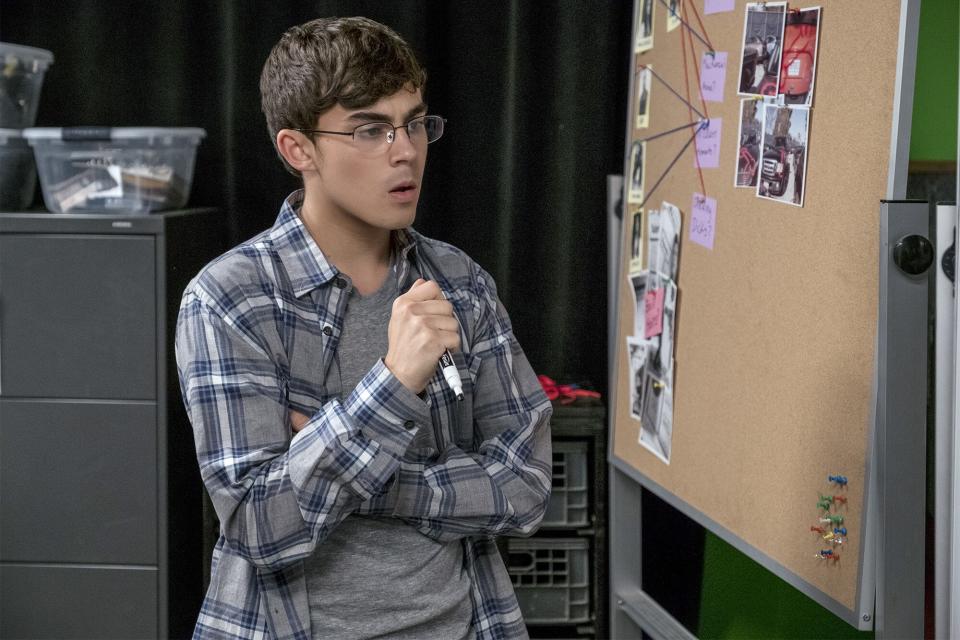
Tyler Golden/Netflix Tyler Alvarez in 'American Vandal'
ENTERTAINMENT WEEKLY: Take me back to those first pitch meetings for American Vandal. What do you remember most about the pitching process?
DAN PERRAULT: We had a sort of unorthodox pitch because it was a very unusual show. We had all these visuals we prepared for it. I'm going to try to keep this clean, but we had a particular sort of graffiti that would play a part in the show. We would ask executives to analyze the differences, as if they were the actual documentarians. So, there were elements of it that were almost interactive—
TONY YACENDA: What you're not saying is that there were whiteboard dicks and parking lot dicks. You don't have to censor yourself. [Laughs]
I appreciate the concern, but you definitely have my permission to use the word "dicks." I mean, it's kind of central to the show.
PERRAULT: Okay. [Laughs] So, we had sample graffiti dicks in the actual pitch itself, and after we set up the general premise of what the show was, we would go over the details of the case. In the same way that Sarah Koenig did with Serial, we wanted you to feel like you're a participant. We wanted to make the people listening to our pitch feel the same way because at the end of the day, this was a love letter to those true-crime docs that came before.
YACENDA: I think that was the biggest thing we had going for us in that pitch. Sarah Koenig kind of gave us the template that was peaking when we were pitching the show. She had such an interesting voice when it came to mystery and true-crime content. Before her, it was very much like, "Here's how the justice system and the police f---ed up." I feel like Serial was one of the first times where there was some humility. She comes out and is like, "When I look at [a suspect], he just looks like somebody who's innocent. I know, it's stupid, right?" She was admitting that she was biased. She was telling you: "I'm an unreliable narrator. So, let's figure this out together."
To us, that was the perfect voice to pitch a story about a high school. Dan did a bit of a Serial impression. I would talk about how we would execute the show philosophically, and Dan would talk about it like it was a real crime, and we were just trying to get to the bottom of who drew the dicks.
PERRAULT: I remember some executives asking me questions while I was in character, like, "Are these based off of real people?" I would just have to say, "No, these are real people." I felt like a jerk just shutting them down, especially having essentially no credits before we pitched that show. [Laughs] But it was fun for Tony to be the one who could speak to everything on a directorial level, and I could be in character and give the ridiculous case details on my end.
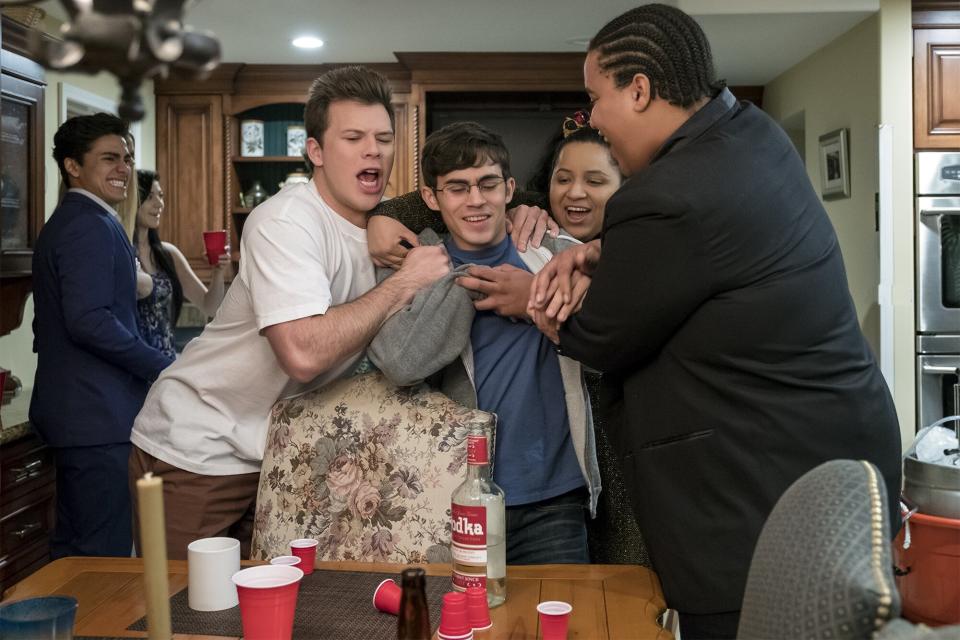
Tyler Golden/Netflix Jimmy Tatro, Tyler Alvarez, Jessica Juarez, and Lou Wilson in 'American Vandal'
You talked about how this show was born out of the true-crime boom. What was it about that genre that you found most fun to play around with?
YACENDA: There was a real love for Making a Murderer and The Jinx and Serial. We found ourselves watching it the way they want you to watch it: You're going through all the details, and you have this hubris as you're watching. You're like, "Oh, I'll figure it out. I'm a good judge of character." We wanted to analyze how and why these true-crime documentaries are working on us and getting us to have these conversations about Adnan Syed's cell phone records or Steven Avery's blood samples, as if we have some sort of expertise. We were like, could you do that in a high school? Could you talk about the ball hairs on the whiteboard, or a camp hookup? Did he get to third base? Could you use the engine of a true-crime documentary mystery to kind of Trojan horse a story about high school — and what it's like to be an adolescent in the age of social media?
Mystery storytelling can be tricky, especially over a season-long arc. You have to plot out red herrings and clues without ever tipping your hand to the audience. What was the prep work like in the writers' room, as you were planning all those moments like the camp hookup or the "hey" text with two Ys?
PERRAULT: It's a whole lot of reverse engineering. After we figured out what our crime is and who our main characters are, we would very quickly — within the first week of the writers' room — talk about our final two episodes. What are we building toward? Once we had a foundation of where we begin and where we end, it was a matter of populating that with fun turns.
YACENDA: One of the indictments of the true-crime genre is how much they'll milk things and get into these salacious details that end up going nowhere. But those inconsequential rabbit holes are part of what's fun about a high school story. What I think was a bug in true-crime documentaries is a feature in the comedy that's satirizing it.
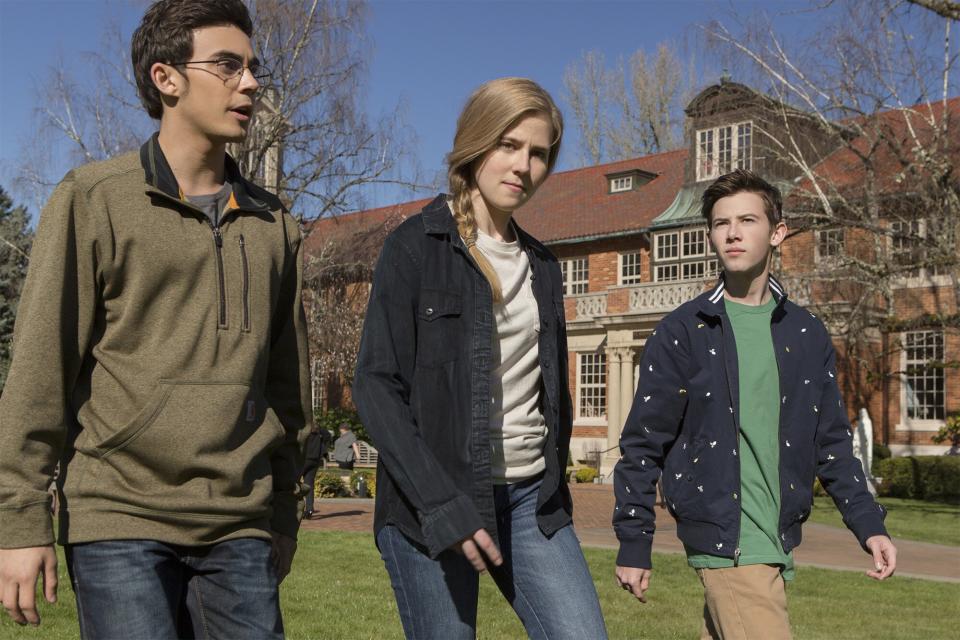
Scott Patrick Green/Netfllix Tyler Alvarez, Taylor Dearden, and Griffin Gluck in 'American Vandal'
It's interesting that you're not parodying a single documentary or true-crime project. You're basically poking fun at the whole genre. What were some of the tropes you had the most fun with?
PERRAULT: I've always been a big fan of the suspicious mid-season character who might know a little more than they let on. And as Tony said, I've always loved the idea of going down a tangentially related rabbit hole, like, "If we can figure out this seemingly unrelated stupid thing, it will pertain to the larger mystery as a whole." I think Nana's party is an example of that, like, "Well, let's figure out who had access to the spray paint can. To do that, we must analyze all these dumb conversations these kids are having and these TikTok videos where people are doing cat-face filters." It's like, how dumb can we make those side stories? But how strong can we make the connection to the main story?
I wanted to ask about Nana's party because that is such a standout episode. Did you really film the whole thing on actual cell phones?
YACENDA: Yeah. Because we see so much on cell phones now, and that's so much of the content we're consuming! There's something about the lens and how an image looks and how the camera moves that is so hard to mimic with a large-sensor camera with interchangeable lenses.
PERRAULT: Not to mention, you would just be creating more work for yourselves to replicate an iPhone video later, when you could just film that way.
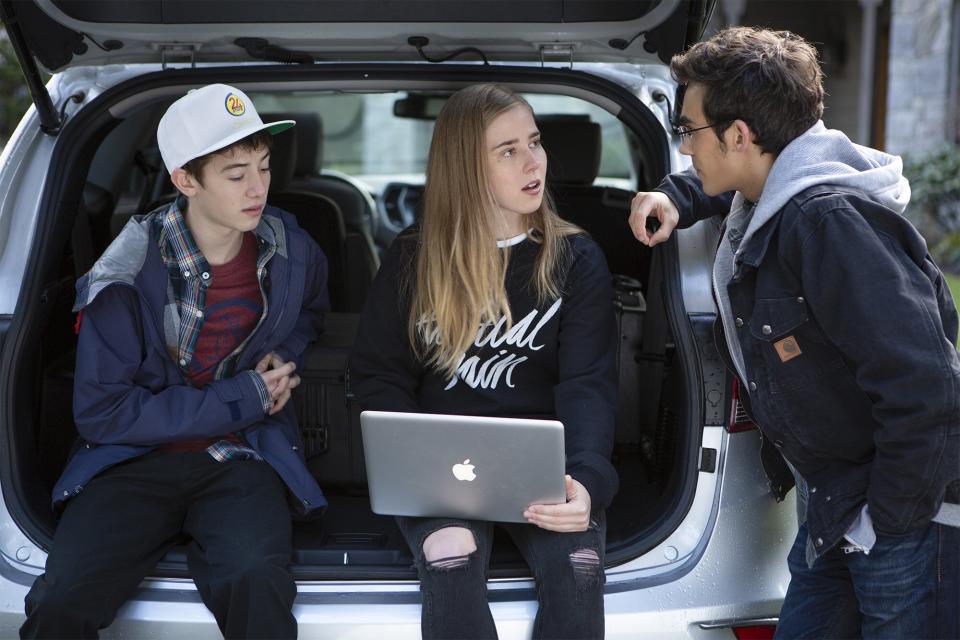
Scott Patrick Green/Netflix Griffin Gluck, Taylor Dearden, and Tyler Alvarez in 'American Vandal'
One thing that always impressed me about American Vandal is how the high schoolers actually look and sound like high schoolers. That's something that TV usually doesn't get right. How did you work with both the writers and the actors to make it actually feel like high school?
YACENDA: What's interesting is we did a lot of research. We talked to kids, like, "What kind of music are you listening to these days?" We also had this philosophy that we didn't want to use too much current slang. We wanted it to be a little more evergreen, even though kids were realistically using some of this slang. I remember when I was a kid, if I was watching something and the characters are using the exact slang that me and my friends were using, it felt wrong — like it was old guys trying to be young. So, ironically, I think one of the reasons it feels real is because it was a very purposeful decision to keep it a bit more evergreen.
PERRAULT: Another thing is that our cast was obviously very young. We did a lot of improv takes, where we're not coaching them on exactly what to say. So, it would come out the way it would come out of a young person. I think it would be a huge misstep to assume you've got the modern lingo down at any phase past high school, so we certainly didn't try to overstep there.
YACENDA: That's a good point, Dan. The very first thing we shot with Tyler Alvarez, I was like, "I want you to write some of your questions, and I'm going to give you some time with each of our characters to interview them for your documentary." So, he worded his questions a bit more like a 19-year-old would word some of these questions, and our actors are responding to it in real time.
PERRAULT: We really wanted it to feel as authentic as possible, and I think we could have easily overstepped if we pushed them too hard in performance notes. One thing we loved about Sarah Koenig is her incredible passion about the subject and finding the truth. That sort of investment is infectious. Tyler, he himself was so invested in the show and the case. He's always a part of our conversations when we talk about doing a new season or something. He's naturally super interested, and that sort of investment is infectious.
So, you make season 1, and it's a hit. Then, you return for season 2, with fewer dicks, and more poop. What was the process of moving on to a second mystery?
PERRAULT: One thing that lead our brainstorming was: What are major documentary tropes and subgenres of true crime that we haven't hit yet? With season 2, a major one was the sort of "elusive murderer" subgenre, with multiple victims. That led to the idea of: What if there was a serial pooper?
YACENDA: That was the big thing. It's fun when you go a little darker with the second installment, like Empire Strikes Back. We wanted the scope to be bigger.
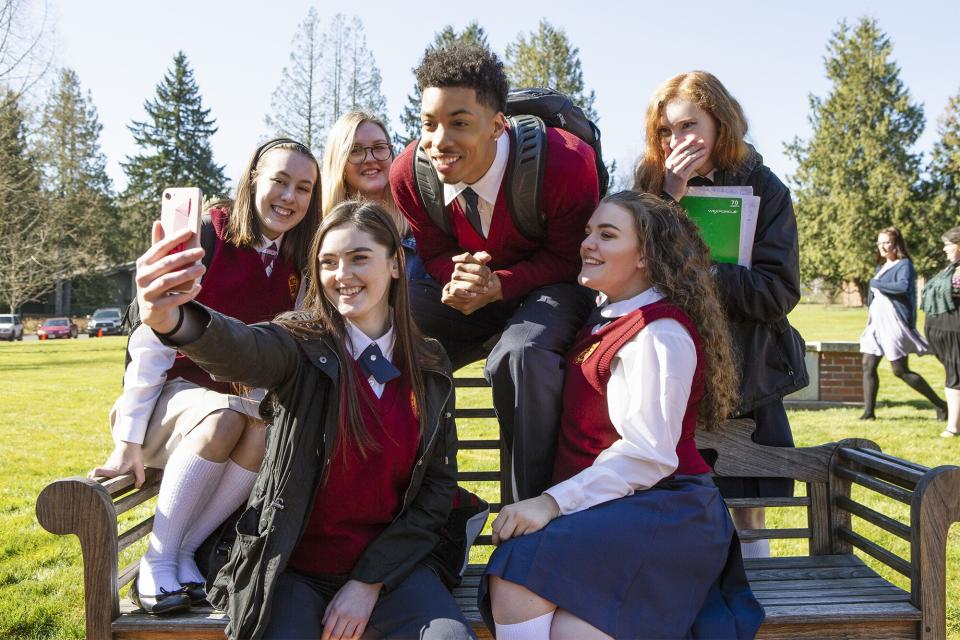
Scott Patrick Green/Netflix 'American Vandal' season 2
I know a lot of people are still holding out hope for a third season. Do you have an idea of what your ideal season 3 would look like?
YACENDA: Yeah, we know what our third season would be and where the series would go. It's somewhat evergreen, so we could kind of hop back into it whenever the timing felt right, and if we felt like there was an audience that was clamoring for it. But the answer is that we do have a game plan that we're very excited about.
PERRAULT: We've now done three seasons of documentaries if you include Players. There were certain things in Players that were an evolution of things we learned from Vandal. But you always want to bring something new. That's what excites us the most: What can we do that allows the experience to be more immersive and real than the previous one?
That was something I wanted to ask about: American Vandal was your first show. What was the biggest takeaway or learning from making those first two seasons?
YACENDA: We were very fortunate that Netflix was at a time where they could take real risks, and they were very trusting of us. It was also an incredibly inexpensive show for them, so that was the sort of value proposition: Either it works, or it doesn't, but the stakes weren't incredibly high. The great thing is that we were doing something that had never really been done in this way before. Using documentary tools and staying as true to the format as we were staying, it was a little bit easier to have the confidence to stick to our guns and the rules of our world. We knew that even if it doesn't connect, at least it's going to be cohesive and it's going to be unique, at least we're doing something in the comedy space that has never really been done before. That was the safety net, and it gave us a bit more confidence than it would have if we were just making a more traditional, scripted narrative.
PERRAULT: But we really didn't know how people would react to it. It was a really fun ride that people responded. We were making something a little unusual, but I'm glad we stuck to our guns and tried. We also thought Vandal would be a much smaller production web series, and I really credit our friends at CBS, Funny or Die, and 3 Arts who saw it as something bigger.
YACENDA: And for Netflix to take a roll of the dice. It is wild that they gave this project the thumbs up. We're forever grateful.
This interview has been edited for length and clarity.
Sign up for Entertainment Weekly's free daily newsletter to get breaking TV news, exclusive first looks, recaps, reviews, interviews with your favorite stars, and more.
Related content:

